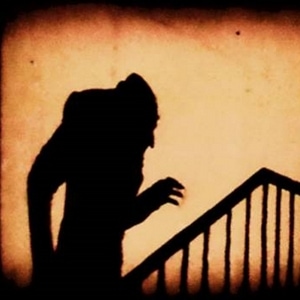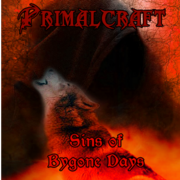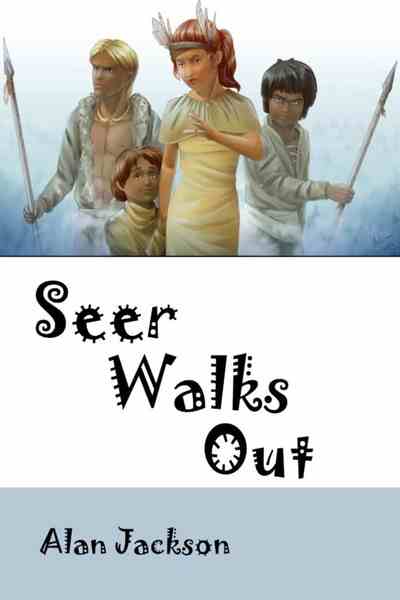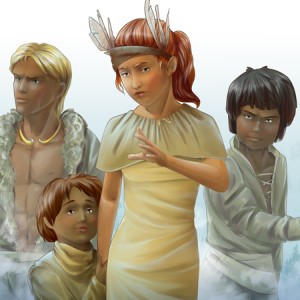The camp was an hour’s dawdle away through ash and oak woods, on a shelf in the hillside between two streams, and a good bit higher than the Grey Bog. It was big, too – twice the size of our camp. I tried not to look at the stake in the middle of the dancing floor.
The chief turned out to be a generously proportioned – all right, he was as fat as a boar; the skin of his belly flopped forwards in folds onto his knees. Also he was loud, and welcoming in an ‘I may still decide to eat you’ sort of way. He sat on his high seat on the edge of the dancing floor, and had had time to get his formal stuff together: a fringed cloak, a tasselled and ochred spear, and his collar.
Especially the collar. Even his magnificent chins couldn’t hide it: two fingers wide, twisted and engraved, and gold. Pure, solid, shining gold.
Now, we aren’t savages; we’ve seen gold before, in fact our last Chief had a gold ring that went to the fire and the earth with him. And I know gold is just another kind of stone, and presumably the Mistwaters are nearer to wherever it’s dug out of than we are, but even so, there was no way our chief was ever going to be wearing a collar like that. It would have cost more than the whole tribe. Yet nothing else here was particularly rich or costly; just normal, really. So how had he come by it?
“Hawk-on-high-bough son of Rope-tight-woven,” he mused, after the formalities had been gone through. “Rope-tight-woven. That would be Rope-tight-woven son of Oak-stands-alone? We have met, I believe, a long time ago, before he became chief. He has other sons, I hope?”
I was glad to see that Hawk did not rise to this deliberately tactless remark. “The Spirits have been generous to my father. He has five sons living, and seven sons prepare for his coming to his Spirit chieftainship – long may they have to prepare.”
The chief smiled, at least around the mouth flab. “You understand, I would gladly give hospitality and a safe passage to friends, and even to strangers; but I will not do so to enemies of my Tribe. Now, Longwood Tribe is too close to us to be strangers. We even claim to have a border with one another, though it is rare for a Longwood brave to dare to approach it. So are you friends of the Mistwater or enemies?”
Accurate facts, accurate argument, friendly tone, gratuitously insulting phrasing. It was easy to see how he’d become chief. I hoped, I really hoped Hawk wouldn’t rise.
“It is true that we rarely see Mistwater braves at the Endstone,” Hawk replied, very even toned, “and I for one wish we met more often. But I have heard that the Valley Tribe is enemy to the Mistwater Tribe, as they are to the Longwood Tribe, and my enemy’s enemy is my friend.”
The chief relaxed conspicuously, and therefore so did the others. He spread his hands out sideways, and drew himself up.
“That is a wise argument, from a wise son of a wise chief.” There were murmurings of agreement all around. “But…” he folded down again. “But it has to be said that a brave of the Pools Tribe could say as much, for they most certainly are enemies of the Valley – and yet they are enemies of ours, too.” He paused. The camp was very quiet. “I can not remember, Hawk-on-high-bough, Chief’s son of the Longwood Tribe, are the Pools Tribe enemies of the Longwood Tribe, or are they friends?”
The very trees fell silent. There was not a sound in the camp, in the forest, in the air. What would Hawk answer? Hawk was not chief; he had no right to commit the Tribe to war: but he was the chief’s son; he could commit the Tribe to war. A mere leader of a hunting band would never have been asked, or would have had every right to brush the question aside. Hawk could not. What would he do?
“Great Chief of the Mistwater Tribe, I too can not remember. We have no Singer with us, but we have a shaman – Seer-of-hidden-things, remind me, are the Longwood Tribe enemies of the Pools Tribe?”
That’s right – pass the buck. A real chief’s trick. Your father would have been proud.
I’ll get you back for this, Hawk.
So I cartwheeled a couple of times, backflipped, bounced round in a circle at the half-crouch tooting a whistle, and then stood up high, reaching my arms to the sky and rattling. I felt it looked impressive, and it gave me time to think.
“In the beginning!” I shrieked. It sounded good, so I did it again: “In the beginning!” Then I dropped to a more comfortable pose and changed to a lower rasping voice. “In the beginning the Longwood Tribe took the Longwood for our own. We fought for our land and held our land that the Spirits had allotted us. Thus fought we the Pools Tribe for the northern hills of the Longwood, and we defeated them, but we could not take more than the hills and when we fought in the valley of the Grey Bog, they defeated us.”
I spun around, rattling rattles. “So the Chiefs met at the Endstone,” I intoned, “and oaths were sworn that the Endstone would be the boundary between our lands and theirs. But no word was spoken of alliance or friendship, only of the Endstone.”
I dropped pitch again, but kept the intoning. “Then time passed and time passed, and the Spirits were angry with the Longwood Tribe, and they took land from us. West and east they took land from us. And in the east it was the Valley Tribe that the Spirits called to chastise us and they took Flat Valley from us, and since that day we have ever been enemies. But it is not said in any tale that the Pools Tribe sent any braves to fight for us, nor did we ask for aid from them, for between us was neither alliance nor friendship, but only the Endstone.”
I danced a bit, and then took up the tale. “Then the Valley Tribe had taken all that the Spirits allowed them, but they wanted more, and they attacked the Pools Tribe and defeated them, and took their land. But it is not said in any tale that we sent any braves to fight for the Pools Tribe, nor did they ask for aid from us, for between us was neither alliance nor friendship, but only the Endstone.”
I knelt down and spread my arms over the dust of the ground. “And we heard and we believed that the Valley Tribe slaughtered the Pools Tribe, leaving not one alive, and that the whole Pools Tribe had gone to their ancestors.” I bowed my head, intoning a few phrases of the Song of the Fallen. “Then our braves would sometimes pass the Endstone, and they found none of the Pools Tribe to meet in friendship nor fair fight, but only tales of ghosts and of birds with flint beaks. And thus it stood, and thus it has stood to this day, that no more news of the Pools Tribe has come to the Longwood Tribe but this, O Chief’s Son.”
I somersaulted to my place and fell silent. There you are, Hawk! Make what you can of that!
Hawk turned back to the Mistwater chief, and struck a big pose.
“I thank you, Seer-of-hidden-things, shaman and speaker, for your wise words. Thus it is seen and heard, most wise Chief Strong-deer-hide son of High-beech-tree of the Mistwater Tribe, that we have never had friendship with the Pools Tribe, but since we had believed them destroyed from the earth, and since until this very day we had no news of them, it is hard to say that we are enemies. But since they are your enemies, if we were your friends than they would be our enemies too, for friends stand shoulder to shoulder. But such matters are for great chiefs like yourself and my father to decide, not for a humble brave, however much he might welcome such friendship.”
“And you would welcome such friendship?”
When the alternative is being tortured slowly to death. Mm, hard call.
“For my part, I would. But I fight my Tribe’s enemies, and my Tribe’s enemies are those the Longwood Chief declares as enemies.”
“So I need a better token than your word if I am to treat you as friends, and allow you passage through our lands. I wonder now, what would be a suitable token? Perhaps the Spirits may guide my choice?”
An obvious cue. And on cue, there was a rustling behind him, and a shaman came dancing out.
The Mistwater shaman. I hadn’t seen her for years, and her style came fresh to me. Much less acrobatic than me, more still patches in her dance – they worked, though, because she had an ominous quality about her that made her stillnesses ominous too. Her masked face was long and narrow, her breasts were large enough to need cross-binding, her skin was greased, so that she had alternate patches of glossy tan and white dust, and she was tall and heavy boned – but then I knew she was something like twice my age, so it wasn’t surprising.
Her voice, when it came, was really effective. Unearthly screech, yet quiet; you felt as though you were listening to a grave opening. I began to feel I still had a lot to learn about being a shaman. I remembered the last time I’d seen her – my mother took me with her when the last Mistwater shaman died and this one was sent through the fire and the water to the shaman’s tent. She’d seemed so clumsy, so mechanical compared to my mother. Now I suspected the comparison might go the other way: she was good. Very good.
“The Spirits!” she intoned. “The Spirits! You call on the Spirits for so easy a matter! So give them an easy task.” She laughed, like a grinning skull. “They spoke of birds with flint beaks – they know so little! Let them bring you such a bird – let that be their token and let such be the token for all of their Tribe who wish to step on Mistwater land. The Spirits have spoken!”
She vanished behind the Chief’s chair again.
Chief Strong-deer-hide smiled and stood up. “The Spirits have spoken,” he declared. “For today you may eat and sleep here. Tomorrow my braves will take you to our border with the Grey Bog, and nor you nor other of the Longwood Tribe shall again enter our land without such a token. No doubt the Spirits will send word to your Tribe of all our words today.” In other words, his shaman will speak to the Valley shaman who will speak to my mother. I only hope she’s sober enough to understand.
Do you know, just for one moment then, I actually missed the old lush.











Comments (0)
See all